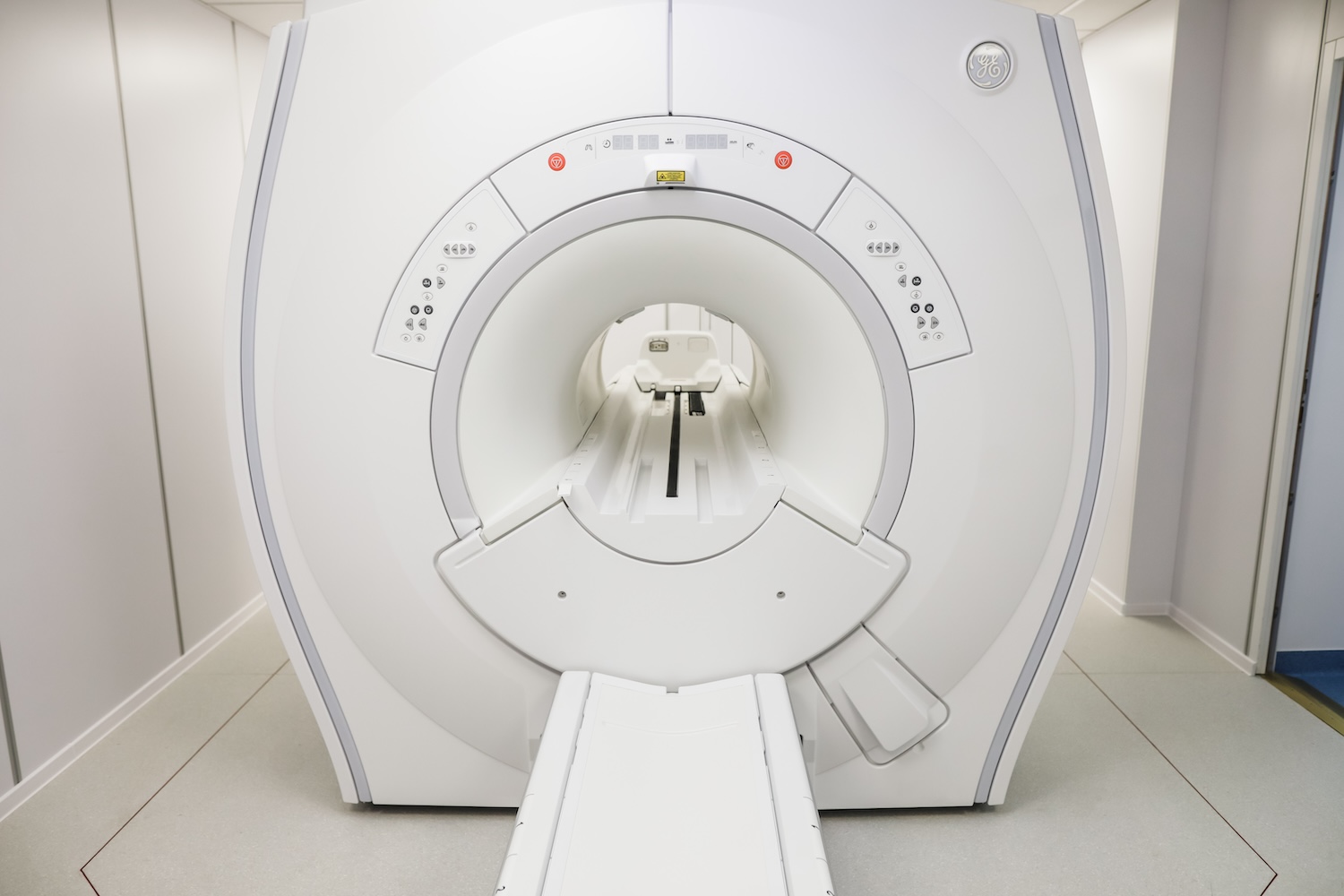Visualizing Vitality With Advanced Technology
MRAs have revolutionized the way we diagnose and understand conditions like atherosclerosis, aneurysms, and other vascular disorders, all in a painless and non-invasive way.
In Canada, heart disease is the second leading cause of death after cancer, and a leading cause of hospitalization
Public Health Agency of Canada, 2022
- Test : Magnetic Resonance Angiogram (MRA)
- Early Detection Of : Coronary Artery Disease, Heart Disease, Carotid Artery Disease, Peripheral Arterial Disease, Pulmonary Artery Disease

Magnetic Resonance Angiograms (MRA)
Magnetic resonance angiography is an imaging test that shows your blood vessels and blood flow.
An MRA can detect narrowing or blockages in your arteries in a way that is non-invasive.
You have the option of having a non-enhanced MRA, which is without contrast, or a contrast-enhanced MRA. The images can be two-dimensional or three-dimensional.
An MRA uses a strong magnetic field and radio waves to create images. Unlike an X-ray, an MRA does not use radiation. Instead, it gets information from energy your body gives off in a magnetic field.
Early Diagnosis of Issues in Your Arteries
Peripheral Arteries
Carotid Arteries
Renal, Pulmonary, and Coronary Arteries
Renal arteries carry a large amount of blood from the heart to the kidneys. The kidneys filter waste and excess fluid from the blood.
Pulmonary arteries carry deoxygenated blood from your heart to your lungs. Your blood needs to reach your lungs to gain oxygen and get rid of waste products like carbon dioxide.
Coronary arteries supply blood to the heart muscle. All three of these arteries play crucial roles for the body to function properly, and thus early detection is extremely important.
Benefits of an MRA Scan
Highly Detailed Images
Early Detection
Patient-Friendly

Don’t become a statistic.
Invest now in your future health and be fit for the long term.
How an MRA Scan Works
Step 1: Preparation
Step 2: MRA Scan
Step 3: Removal

Reasons to Get an MRA Scan
Aortic Dissection
Pulmonary Embolism
Aneurysm
Packages
Invest-Med offers thorough health packages designed to meet the individual needs of our patients.
You can choose between a risk-specific package or a comprehensive package to analyze your health and wellbeing.
Our health packages include rapid access to diagnostic testing using state-of-the-art technology, searching for 500+ diseases in the body, including cancer and heart disease.
Each package includes a comprehensive 1 hour physical exam and 1 hour medical review of results with recommendations to achieve optimal health.
Package costs will vary based on individual diagnostic test recommendations. Financing options are available.
Private MRI Health Packages
Full-Body MRI + Metabolic Blood Panel
Package starting at $5,699*
A Full-Body MRI proactively searches for 500 diseases lurking inside the body.
This package evaluates of overall metabolic efficiency by analyzing of a comprehensive range of biomarkers.
- Advanced lipid profiles
- Insulin resistance
- Indicators of inflammation
- Key measures of organ function
All Private MRI packages also include:
- Physician read results
- Long term plan of action
- Ongoing care with referrals
*Package cost will vary based on individual diagnostic test recommendations. Financing options are available.
Full-Body MRI + Cardiac Blood Panel
Package starting at $5,699*
A Full-Body MRI proactively scans the entire body to detect up to 500 hidden diseases.
A series of assessments used to evaluate cardiovascular health.
- Assessment of heart function indicators
- Measurement of cholesterol levels
- Measurement of triglycerides
- Evaluation of key inflammation markers
All Private MRI packages also include:
- Physician read results
- Long term plan of action
- Ongoing care with referrals
*Package cost will vary based on individual diagnostic test recommendations. Financing options are available.
Full-Body MRI + Hormone Blood Panel
Package starting at $5,699*
A Full-Body MRI scan can identify over 500 potential health conditions within the body.
A comprehensive evaluation of overall hormonal health and balance with an in-depth analysis of key hormones.
- Thyroid hormones
- Cortisol and other adrenal hormones
- Estrogen, progesterone, and testosterone
- Insulin levels
All Private MRI packages also include:
- Physician read results
- Long term plan of action
- Ongoing care with referrals
*Package cost will vary based on individual diagnostic test recommendations. Financing options are available.
Full-Body MRI + All 3 Blood Panels
Packages starting at $6,999*
All Private MRI packages also include:
- Physician read results
- Long term plan of action
- Ongoing care with referrals
*Package cost will vary based on individual diagnostic test recommendations. Financing options are available.
Risk-Specific Screening Packages
Cancer Screening Package
Mitigate your cancer risk with preventive screening.
- MRI
- DNA testing – 84 genes for cancer
- Mole mapping
- Advanced blood work
- CT scan
- Virtual colonoscopy
Proactive testing can detect changes in your body that could become cancer.
*Package prices range from $3,999 to $14,999.
Package cost will vary based on individual diagnostic test recommendations. Financing options are available.
Stroke Screening Package
Knowing your risk for stroke can save your life.
- MRA – Magnetic resonance angiography
- DNA testing – 83 genes for heart conditions
- Advanced blood work
- Carotid doppler ultrasound
- Echocardiogram
Detect your risk of stroke early, even before symptoms present themselves.
*Package prices range from $3,999 to $14,999.
Package cost will vary based on individual diagnostic test recommendations. Financing options are available.
Heart Disease Screening Package
Early screenings are essential for heart disease prevention.
- Coronary calcium score
- DNA testing – 83 genes for heart conditions
- Advanced blood work
- Exercise stress test
- Echocardiogram
- CT coronary angiography
Screening for cardiovascular risk factors before you develop heart disease, can help you prevent it.
*Package prices range from $3,999 to $14,999.
Package cost will vary based on individual diagnostic test recommendations. Financing options are available.
Comprehensive Screening Packages
Comprehensive Screening Package
Get the right screening tests at the right time.
- Whole body MRI
- Coronary calcium score
- DEXA scans
- Microbiome gut testing
- Genetic testing+
- Heart health workup
- Cancer risk review
- Mole mapping
- Screen for all material risks
Prevention is key to longevity, whether or not you are presenting symptoms or risk factors.
*Package prices range from $3,999 to $14,999.
Package cost will vary based on individual diagnostic test recommendations. Financing options are available.
Corporate Services
Please contact us for a custom corporate package. Specialized corporate rates available.
- Comprehensive, proactive health plans
- Customized screening tests
- Extensive medical risk assessments
- Preventive approach to healthcare
Proactively manage executive wellness.
FAQ
What is the difference between an MRI and an MRA?
Can MRA be performed without contrast?
How long does an MRA test take?
How should I prepare for an MRA?
Firstly, your healthcare provider will begin by asking you questions to ensure you do not have any metal in your body that could be a potential hazard during an MRA. This could be a medical device, a foreign object from an accident, or even a piercing.
You must also notify your provider if you are pregnant or breastfeeding, or about any health issues, allergies, or surgeries you have had. If you have any kidney or liver diseases, your provider may not be able to use contrast for your scan.
If you get uncomfortable in tight spaces, you can ask your provider for a sedative that you can take prior to the MRA scan.
What are the risks of an MRA test?
An MRA scan is non-invasive and painless. You may feel a slight pinch when they put the IV in your arm.
It is possible to have minor side effects from the contrast dye, such as headaches, nausea, or allergic reactions. However, this is rare.
Are MRA scans safe?
Learn More
